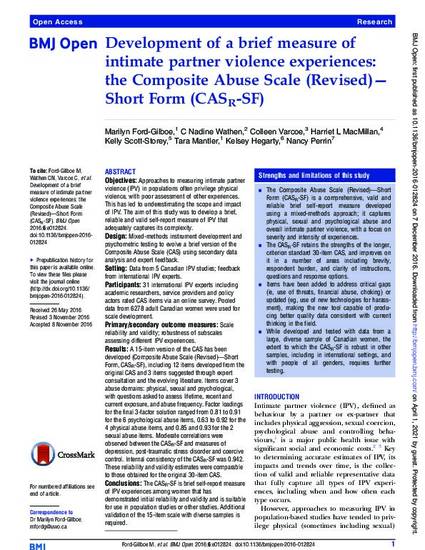
Objectives: Approaches to measuring intimate partner violence (IPV) in populations often privilege physical violence, with poor assessment of other experiences. This has led to underestimating the scope and impact of IPV. The aim of this study was to develop a brief, reliable and valid self-report measure of IPV that adequately captures its complexity. Design: Mixed-methods instrument development and psychometric testing to evolve a brief version of the Composite Abuse Scale (CAS) using secondary data analysis and expert feedback. Setting: Data from 5 Canadian IPV studies; feedback from international IPV experts. Participants: 31 international IPV experts including academic researchers, service providers and policy actors rated CAS items via an online survey. Pooled data from 6278 adult Canadian women were used for scale development. Primary/secondary outcome measures: Scale reliability and validity; robustness of subscales assessing different IPV experiences. Results: A 15-item version of the CAS has been developed (Composite Abuse Scale (Revised)-Short Form, CASR-SF), including 12 items developed from the original CAS and 3 items suggested through expert consultation and the evolving literature. Items cover 3 abuse domains: physical, sexual and psychological, with questions asked to assess lifetime, recent and current exposure, and abuse frequency. Factor loadings for the final 3-factor solution ranged from 0.81 to 0.91 for the 6 psychological abuse items, 0.63 to 0.92 for the 4 physical abuse items, and 0.85 and 0.93 for the 2 sexual abuse items. Moderate correlations were observed between the CASR-SF and measures of depression, post-traumatic stress disorder and coercive control. Internal consistency of the CASR-SF was 0.942. These reliability and validity estimates were comparable to those obtained for the original 30-item CAS. Conclusions: The CASR-SF is brief self-report measure of IPV experiences among women that has demonstrated initial reliability and validity and is suitable for use in population studies or other studies. Additional validation of the 15-item scale with diverse samples is required.
Available at: http://works.bepress.com/n-wathen/6/
